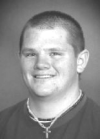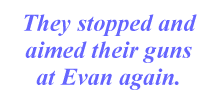Columbine Survivors To Speak
—— Marilyn Duff
Where
were you when you
first heard about . . . ?
Finish the sentence.
Depending on your age, it could be Pearl Harbor, the assassination of John F. Kennedy or the bombing of Baghdad. Now we can add another one—the Columbine shootings.
 That
catastrophe is now seared into our memories. Perhaps we were going about
our business that spring day, April 20, 1999, when a friend told us to
turn on the TV. In America’s heartland, someone was wandering the
halls of a high school, pumping bullets into kids. The horror of it fought
its way into our consciousness, as we adjusted the TV and watched kids
running from the building at Columbine High in Littleton, Colorado, their
hands on their heads. It was happening that very minute, and we were paralyzed
by the sight.
That
catastrophe is now seared into our memories. Perhaps we were going about
our business that spring day, April 20, 1999, when a friend told us to
turn on the TV. In America’s heartland, someone was wandering the
halls of a high school, pumping bullets into kids. The horror of it fought
its way into our consciousness, as we adjusted the TV and watched kids
running from the building at Columbine High in Littleton, Colorado, their
hands on their heads. It was happening that very minute, and we were paralyzed
by the sight.
How could this be? We send our kids to schools to be safe from harm. Where were the teachers? The principal? Why hadn’t the police gotten control of the situation—captured this madman that was stalking the halls of a public school building?
And then the news: It wasn’t a madman. It was two boys, teenagers
t
One of those classmates, the first one in the library to be shot by Eric
Harris and Dylan Klebold, was Evan. He will tell his story at the 2001
Care Conference to be held at the Crystal Cathedral on March
17, 2001. Evan, Richard, Elisha, and Courtney (when they
do speaking engagements, they only use their first names) will be
featured speakers at Care-iffic Saturday,
which concludes the three-day International Conference on Care and Kindness.
Evan, a Christian and an Eagle Scout, not only survived that day, but
has gone on to tell his story and to witness to the world his conviction
that Christian goodness must triumph over the evil that is rampant in
our society.
 In
his personal account of that day, Evan tells of hearing the gunshots hemselves,
students at the school. They had automatic weapons. And they were killing
their classmates at random.down the hall as he sat at a table in the library
with his buddies, and of a teacher running in, bleeding and yelling, “Get
under the tables! There are two students with guns—shooting!”
Evan hid behind a pillar, but in an instant the killers were there, standing
in the door of the library with semi-automatic weapons, surveying the
room filled with kids. Many were crouched under tables, desperately trying
to hide.
In
his personal account of that day, Evan tells of hearing the gunshots hemselves,
students at the school. They had automatic weapons. And they were killing
their classmates at random.down the hall as he sat at a table in the library
with his buddies, and of a teacher running in, bleeding and yelling, “Get
under the tables! There are two students with guns—shooting!”
Evan hid behind a pillar, but in an instant the killers were there, standing
in the door of the library with semi-automatic weapons, surveying the
room filled with kids. Many were crouched under tables, desperately trying
to hide.
Too late, as he saw the killers with guns, Evan dove under an oak desk.
They opened fire on the area where he hid. A bullet hit him in the back,
another grazed his neck and the edge of the desk, spraying his face with
oak fragments. A splinter the size of a toothpick lodged in his eyelid,
just above the eyeball. The killers, believing they’d killed him,
moved on.
In horror, Evan heard them question Cassie Bernall about her belief in
God, and her brave answer, “Yes, I do believe in God.”
He heard the shots that killed her. He heard them confront Isaiah Shoels,
singled out because he was an African American. “We don’t
like niggers...” one of them said, and Todd heard the shots that
killed Shoels, too.
 The
killers roamed the library for twenty or thirty minutes, methodically
taking out one innocent victim after another. They paused now and then
to pound on the locked doors where two librarians hid, or to put down
their weapons and reload, or to discuss whether it might be better to
begin using knives on their next victims. When they finally moved to leave
the library, they spotted Evan, still alive under the desk. They stopped
and aimed their guns at him again.
The
killers roamed the library for twenty or thirty minutes, methodically
taking out one innocent victim after another. They paused now and then
to pound on the locked doors where two librarians hid, or to put down
their weapons and reload, or to discuss whether it might be better to
begin using knives on their next victims. When they finally moved to leave
the library, they spotted Evan, still alive under the desk. They stopped
and aimed their guns at him again.
Evan tells how he talked them out of killing him, and how, as the two
finally left the library, one said, “It’s your lucky day,
kid.” Then, as they turned to leave, one said, “Let’s
go down to the cafeteria,” a remark that Evan remembered later.
Yet his day wasn’t through. David Ross, Assistant Chief Scout Executive of the National Boy Scouts of America, said later: “After escaping from the library, Evan’s character allowed him to help save the lives of two other students. Evan carried a handicapped student out of the line of fire to the safety of a patrol car. Coming across another seriously injured student who was shot in the face, arm, leg and neck (severing an artery), Evan administered first aid to keep the student alive and conscious until he could be transported by emergency responders to the hospital.”
He continued, “While caring for the student, Evan also described accurately to the police the two gunmen, gave their current location in the school (the cafeteria) and the weapons they were carrying. Despite his injuries, he also helped the police load injured student’s into patrol cars immediately outside the building.” As a fellow student stated, “Evan also did everything in his power to keep fellow students around him calmed and reassured.”
For these acts of bravery and responsibility under duress, Evan and four
other Boy Scouts were  awarded
the highest honors the Boy Scouts of America bestow. Evan is also now
an Eagle Scout.
awarded
the highest honors the Boy Scouts of America bestow. Evan is also now
an Eagle Scout.
Psychologists and cultural analysts who gave their opinions afterwards
varied in their theories as to what could have caused two teens to open
fire on their fellow students that day at Columbine High School. Those
blamed have been absent or disinterested parents; violent video games
and alienation from society.
Evan’s experience has left him wise beyond his years, and he, too,
has thought deeply about the causes of such violence and evil. A devout
Christian, he’s made it his mission to travel the country when he
can, witnessing to his Christian faith, telling audiences about that day
at Columbine and, more importantly, discussing what he believes society,
and Christians, need to do to prevent it from ever happening again.
You will not want to miss Evan’s message.
Mark your calendars
and make your reservations early for the
2001 Conference at the Crystal Cathedral, Garden Grove, CA.
March 15 – 17, 2001.
![]() Return to Care Capsule Front Page
Return to Care Capsule Front Page